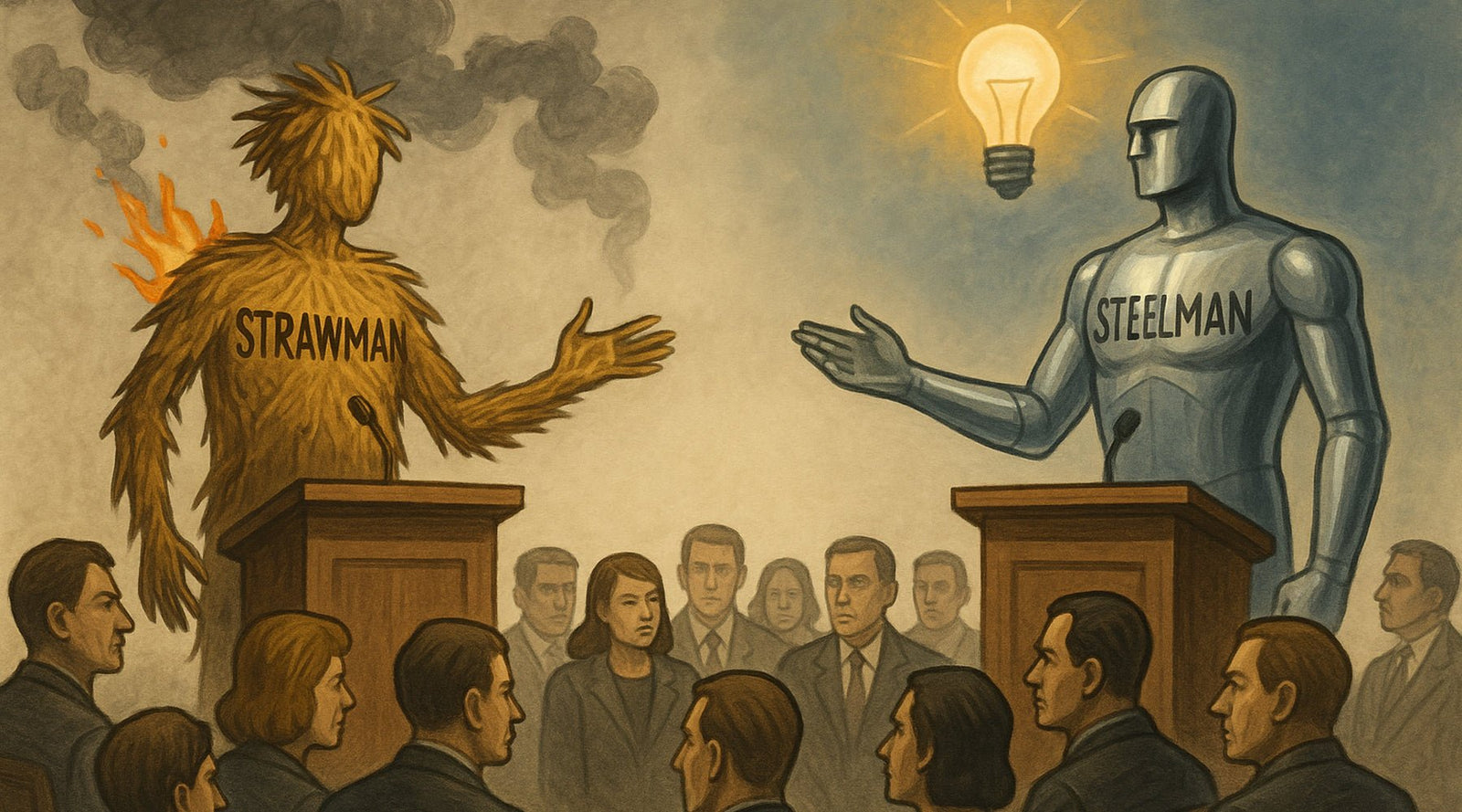In the realm of ideas, how we engage with opponents’ arguments is as important as the conclusions we draw. The distinction between a strawman and a steelman argument lies at the heart of intellectual integrity.
To strawman is to distort, oversimplify, or caricature an opponent’s position to defeat it more easily.
To steelman is to reconstruct the argument in its strongest and most persuasive form—even stronger, perhaps, than the original proponent could express—before attempting a rebuttal.
This difference is more than rhetorical. It reflects the discipline, humility, and courtesy required for serious philosophy, public debate, and civil discourse. The strawman is the weapon of the polemicist. The steelman, by contrast, is the tool of the thinker.
The Strawman: Easy Victory, Hollow Gain
The strawman is appealing for obvious reasons. It allows the debater to face a simplified opponent—a bundle of hay, easily torched—rather than the full weight of a real position. By exaggerating flaws or ignoring nuance, one can secure applause from allies and the illusion of victory. Yet such victories are hollow. They prove nothing except the debater’s ability to misrepresent.
Philosophically, the strawman corrodes truth-seeking. It tells the audience less about the position under discussion and more about the debater’s unwillingness to confront it honestly. It is a form of intellectual cowardice: easier than grappling with complexity, but ultimately sterile.
The Steelman: Discipline of the Mind
The steelman demands the opposite. To steelman an argument, one must inhabit it. One must reconstruct it in a way that the original speaker could recognize and endorse. This requires active listening, charitable interpretation, and intellectual empathy. In doing so, one learns to discipline the mind: to withhold judgment long enough to understand another worldview on its own terms.
This discipline is not just a mental exercise; it is a form of respect. It signals to an opponent—and to the audience—that one values reason above victory. To attack the strongest possible version of a position is to demonstrate confidence in one’s own reasoning, while also honoring the dignity of the debate itself.
Courtesy as a Philosophical Virtue
Courtesy in argument is often underestimated. In a polarized world, the temptation is to treat opponents as enemies. Yet courtesy is the recognition that truth does not belong to one camp, and that even the fiercest adversary might carry a fragment of insight. Steelmanning is courtesy intellectualized: it is the act of saying, “I will take you seriously enough to challenge not your weakest words, but your deepest reasoning.”
This approach builds credibility. It shows fairness and wins the respect of thoughtful observers, even those who disagree with the outcome. More importantly, it prevents dialogue from collapsing into mutual caricature, where each side battles only ghosts of the other’s thought.
The Path to Stronger Ideas
There is a paradox at the heart of steelmanning: by strengthening your opponent’s position, you also strengthen your own. Why? Because when you finally refute a steelman, your argument has been tested against the best, not the worst. This ensures resilience. If an idea can withstand the sharpest form of criticism, it earns the right to stand. If it cannot, the failure reveals something valuable: that your own position must be revised, refined, or perhaps abandoned.
Steelman arguments, therefore, are not only about fairness to others—they are about honesty with oneself. They prevent the self-deception that comes from easy victories and force us into the hard but fruitful labor of intellectual growth.
Conclusion: Choosing Steel over Straw
To prefer the steelman over the strawman is to choose truth over triumph, growth over applause, and courtesy over contempt. It is both a matter of philosophical integrity and of mental discipline. In a world eager for shortcuts, the steelman reminds us that serious thought requires patience, humility, and rigor.
When we argue with steel rather than straw, we honor not only our opponents but also ourselves. For in the end, the measure of an argument is not how easily it conquers the weak, but how courageously it engages the strong


